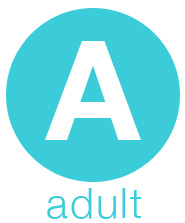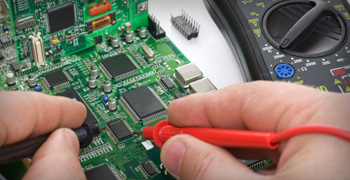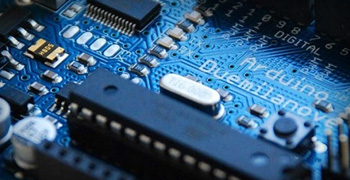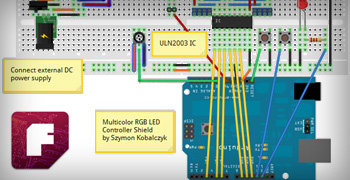Spring 2012 Maker Courses for Adults
 For Spring 2012, we are pleased to announce that we will be extending our course offerings, including Adult programs. We will have more brand new class offerings, more total classes over the course of the season, and some very nice new venues.
For Spring 2012, we are pleased to announce that we will be extending our course offerings, including Adult programs. We will have more brand new class offerings, more total classes over the course of the season, and some very nice new venues.
Many adult courses have the option of being accredited through UCSD Extension.
We are now able to offer certificate programs for post-high school Adults, all available through a unique Fab Lab + UCSD Extension partnership program.
Check out the amazing new MakerPlace – a 14,000 square foot DIY fabrication facility. These classes will be held at the space: 1022 West Morena Blvd, Suite H, San Diego, CA 92110

Custom Circuitry: Turn Your Schematic into a Machine-ready File
If you have a schematic for a board that you’d like to create, we’ll help you get it into EagleCad or Fritzing and get it ready for machining. If you don’t have a custom schematic, and just want to learn the software, we’ll give you a template schematic to work from. We will show you how to use the software and get your file ready to be loaded into the K2 milling machine. Through this process, you will be introduced to tools required to create a custom-made PCB board so that you can continue to work on projects beyond this class.
Level: Beginner
Open to members only
*This class counts as a basic safety and usage class
Saturday April 28, 2012 – 12:00pm-3:00pm
Please Note: Class is Now Saturday May 12th, from 12:00 – 3:00
$75 + $16.16 materials fee – includes PCB and your own specialized bit
Electronics for New-Comers: Electrical Fundamentals

An In-depth Introduction to DC Basics – Everything you need to know to be able to understand and discuss fundamental concepts of electricity and electronics.
This workshop will get you up to speed on both terminology and understanding of electricity and electronics through experimentation and hands-on activities. You’ll be seeing, touching and working with the things that we explain. We will cover Electricity and Analogies, Current, Voltage, Power, Ground, Resistance, Ohms Law, Circuits, Schematics, Series and Parallel Circuits, DC Battery, Breadboard, Wire, Switches, Resistors and LED, as well as a brief description of Arduino (which will include installing the software and exploring the IDE), and lots of examples. Soldering will also be covered. This is a beginner-friendly level workshop. This workshop is hands-on, no boring theory lessons! We will supply the necessary components.
Level: Beginning
Open to Members and Non-Members
For members, this counts as a basic safety course for the electronics lab.
Sunday, April 22, 2012 – 12:00pm-4:00pm
Please Note: Class is now Saturday May 5th, from 11am to 3pm
* If you are not able to attend Arduino 1, you can take this class, as it includes interchangeable principles
$55 + $10 materials fee – includes breadboard, LEDs, copper wire, and components
Learn Arduino
 This 4-part workshop is geared toward beginners as well as more accomplished Arduino users. Beginners should start at Workshop 1, where we will get you up to speed on the fundamentals of electricity and electronics, so that you understand the components you’ll be working with, and can feel confident discussing and building your project. By Workshop 2, we’ll move into an overview of the use of microprocessors, and work with the Arduino to program an LED blink sequence. Workshops 3 and 4 will further advance into the intermediate levels of programming and electronics. By workshop 5, you’ll be integrating Processing with Arduino, adding interactivity to create interactive environments through visual or physical sensing and controls.
This 4-part workshop is geared toward beginners as well as more accomplished Arduino users. Beginners should start at Workshop 1, where we will get you up to speed on the fundamentals of electricity and electronics, so that you understand the components you’ll be working with, and can feel confident discussing and building your project. By Workshop 2, we’ll move into an overview of the use of microprocessors, and work with the Arduino to program an LED blink sequence. Workshops 3 and 4 will further advance into the intermediate levels of programming and electronics. By workshop 5, you’ll be integrating Processing with Arduino, adding interactivity to create interactive environments through visual or physical sensing and controls.
Over the sessions of the course, you will learn all about physical electronics, the inputs and outputs of the Arduino board, going over theories and concepts of electricity and electronics. You will also learn how to code your very own programs using the freely available and open-source software: Arduino, which is similar to C++ and Processing’s IDE. At the end of the course, you will have produced controllers and receptors based on the Arduino microprocessor, in order to accomplish various tasks.
![]()
If you are interested in receiving a certificate of completion for this class, attendees who complete 4 of the 5 workshops are eligible for a UCSD Extension accreditation option. This is an additional cost of $165 upon completion, for the 3 unit UCSD Extension certificate in Engineering. Please let us know if you are interested in this option up front.
Level: Beginning-Intermediate. Beginners should start at class 1 and progress.
Open to Members and Non-Members
Find out more about the Arduino microprocessor here: http://arduino.cc/en/Main/Hardware
Workshop 1
Electrical Fundamentals
An In-depth Introduction to DC Basics – Everything you need to know to be able to understand and discuss fundamental concepts of electricity and electronics.
This workshop will get you up to speed on both terminology and understanding of electricity and electronics through experimentation and hands-on activities. You’ll be seeing, touching and working with the things that we explain. We will cover Electricity and Analogies, Current, Voltage, Power, Ground, Resistance, Ohms Law, Circuits, Schematics, Series and Parallel Circuits, DC Battery, Breadboard, Wire, Switches, Resistors and LED, as well as a brief description of Arduino (which will include installing the software and exploring the IDE), and lots of examples. Soldering will also be covered. This is a beginner-friendly level workshop. This workshop is hands-on, no boring theory lessons! We will supply the necessary components.
Level: Beginning
Open to Members and Non-Members
For members, this counts as a basic safety course for the electronics lab.
Sunday, April 22, 2012 – 12:00pm-4:00pm
Sunday May 6 11:00 – 3:00
* If you are not able to attend Electronics for Newcomers, you can take this class, as it includes interchangeable principles
$55 + $50 materials kit fee (includes tax) – includes Arduino, cable, wire, batteries, LEDs, and all necessary components
Workshop 2
An introduction to Arduino Programming Language & Building a Blink Circuits.
We will progress into programming the Arduino through a hands-on blink sequence exercise, followed by creating a circuit with 8 LEDs in various light sequences that you control. By the end of this workshop, you will be a more accomplished Arduino user, with an understanding of the fundamentals and syntax of the Arduino language, and inputs and outputs. This class is perfect for new Arduino users, as well as more experienced users who may have programming questions.
Level: Beginner (must have completed Workshop 1) or Intermediate electronics and programming experience
Open to Members and Non-Members
For members, this counts as a basic safety course for the electronics lab.
Sunday, April 29, 2012 – 11:00pm-4:00pm
Sunday May 13 11:00 – 4:00
$75 + $50 materials fee – includes Arduino, cable, wire, batteries, LEDs, and all necessary components (If you purchased this for Arduino Workshop 1, you do not need to re-purchase)
Workshop 3
More on Arduino Software
This workshop will be a continuation of the previous from the Arduino series. We will cover more of the Arduino language and learn the difference between digital and analog pins. We’ll learn about debugging and using external Libraries. As always, everyone will be working with their Arduino board, following along to expand on your knowledge and design your personal projects.
Level: Intermediate electronics and programming experience or Completion of Workshops 1-2 required
Open to Members and Non-Members
Sunday, May 6, 2012 – 11:00pm-4:00pm
Sunday May 20 11:00 – 4:00
$75 + $50 materials fee – includes Arduino, cable, wire, batteries, LEDs, and all necessary components (If you purchased this for Arduino Workshop 1, you do not need to re-purchase)
Workshop 4
AC, Capacitance, Semiconductors, and Motors
This workshop is intended as an eye-opener to what is beyond DC electronics. Still using the Arduino, you’ll be able to integrate more components in your circuits, like capacitors, pots and motors!
Level: Intermediate electronics and programming experience or Completion of Workshops 1-3 required
Open to Members and Non-Members
Sunday, May 20, 2012 – 11:00pm-4:00pm
Sunday May 27 11:00 – 4:00
$75 + $60 materials fee – includes Arduino, cable, wire, batteries, LEDs, and all necessary sensors, motors and components (If you purchased this for Arduino Workshop 1, you do not need to re-purchase, only add $10 for additional components)
Workshop 5
Integrating Processing and Arduino
This is a great workshop for projects using interactivity. You’ll learn how to leave all of your intense processing and calculations to Processing, which leaves your Arduino with more time to collect sensor data and more output power – that’s always a good thing.
Level: Advanced electronics and programming experience or Completion of Workshops 1-4 required
Open to Members and Non-Members
Weekend Workshop: Saturday May 27 and Sunday May 27: 11:00pm-4:00pm
Weekend Workshop: Saturday June 2nd and Sunday June 3rd 11:00 – 4:00
$150 + $60 materials fee – includes Arduino, cable, wire, batteries, LEDs, and all necessary components (If you purchased this for Arduino Workshop 1, you do not need to re-purchase only add $10 for additional components)
Girls Geek Out
Workshop: Laser Cut Jewelry
Learn how to use the laser cutter and how to prepare files for laser cutting while creating custom-designed jewelry. Bring your own photo image (file types: .jpg, .psd, .ai, .png, .svg) to etch onto an acrylic or wood shape. If you have a specific shape that you’d like to have cut, you can bring those files as well as we’ll help you trace them. If you don’t know how to design a digital file using Illustrator or Corel, don’t worry – we’ll help you get there. Please bring your image files on a flashdrive/memory stick. If you don’t have files, don’t worry – we will supply you with a set of options. We will provide colored acrylic and wood for you to use – if you’d prefer to bring your own materials, they should be wood or acrylic, ¼ inch thickness or less.
Level: Beginner
Open to Members and Non-Members
Sunday May 13, 2012 – 1:00-4:00pm
Sunday May 13 – 4:30 – 7:30
$55 – includes materials
